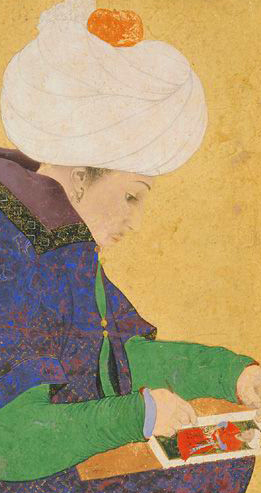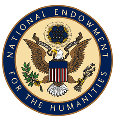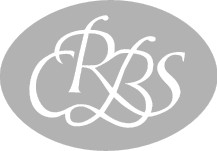
Image: Portrait of a Painter, Freer Gallery of Art and Arthur M. Sackler Gallery, Smithsonian Institution.
Used by permission.
|
|
For a printable version of this letter, click here.
Institute Setting | Accommodations | Application Guidelines
_____________________________________________________________________________
December 2009
Dear Colleague
Thank you for your interest in “Re-mapping the Renaissance: Exchange between Early Modern Islam and Europe,” a National Endowment for the Humanities Summer Seminar for College and University Teachers. This three-week seminar will be held at the University of Maryland, College Park, Maryland, from June 13 through July 2, 2010. The program is designed to explore the ways in which the European Renaissance was shaped by interaction between Europe and the rest of the world, in particular, the world of Islam. We hope that you will add your voice, your research, and your teaching experiences as we embark upon this journey of discovery.
In the course of this exploration of Islam’s contribution to the shaping of the European Renaissance, we will investigate networks of exchange between Islamic and European courts, rulers, merchants, travelers, diplomats, and artists during the early modern period. The seminar will demonstrate that the trade conducted by the Italian city-states was not exclusively an inheritance from the Roman Empire. Rather, it also stemmed from the civilizations of the Mamluk and Ottoman empires and their thriving systems of foreign trade. Those trading networks, in turn, became conduits for the export not only of products but also of ideas, scientific discoveries, and artistic exchange. This seminar will investigate that legacy.
Participants will enjoy lectures, seminar discussions, and visits to the Library of Congress and the National Gallery of Art, both in Washington DC. Time has been set aside each week so that participants may pursue their own reading and research and consult with the directors on their own projects. The seminar will model the use of scholarship to support teaching.
The program will be co-directed by Judith Tucker, Professor in the Department of History and Director of the Master of Arts in Arab Studies Program at Georgetown University in Washington, and by Adele Seeff, Director of the Center for Renaissance & Baroque Studies, University of Maryland. Tucker and Seeff have worked across disciplines and are aware of the challenges this sort of endeavor presents for scholars. Both are interested in cross-disciplinary research and teaching. Both are committed to fostering scholarly communities in which seminar participants feel supported and nurtured. In addition, three exceptional scholars will present sessions on cartography, art history and material goods, and travel narratives.
For the recommended bibliography, the daily schedule with specific reading assignments, and a list of the scholars who will anchor the discussion, please visit the seminar website, http://www.crbs.umd.edu/programs/re-mapping_the_renaissance/index/html. We include here the main points of the seminar to give you a sense of its general organization and scope.
Participants selected for the seminar are expected to participate fully in all sessions throughout the three weeks. This includes attending lectures, contributing to and occasionally leading small-group sessions, and preparing weekly group or individual projects designed in consultation with the co-directors. Time for individual research is built into each week’s activities.
WEEK 1
|
Sunday, June 13, 2010: Participant check-in and welcome reception.
|
Monday, June 14, 2010: Introductions, orientation, framing led by Adele Seeff and Judith E. Tucker. Participants share research interests and potential plans; break into informal working groups to exchange ideas and suggestions.
|
Tuesday, June 15, 2010: Cartography led by Alison Sandman, James Madison University
|
Wednesday, June 16, 2010: Visit to Library of Congress led by Alison Sandman and Adele Seeff.
|
Thursday, June 17, 2010: Research day.
|
Friday, June 18, 2010: Research day.
|
|
WEEK 2
|
Monday, June 21, 2010: Travel Narratives led by Ahmad Karimi-Hakkak, University of Maryland
|
Tuesday, June 22, 2010: Trading Patterns led by Judith E. Tucker, Georgetown University
|
Wednesday, June 23, 2010: Research day.
|
Thursday, June 24, 2010: Cultural and Scientific Exchange led by Judith E. Tucker.
|
Friday, June 25, 2010: Research day.
|
|
WEEK 3
|
Monday, June 28, 2010: Material Goods led by Meredith J. Gill, University of Maryland
|
Tuesday, June 29, 2010: Visit to the National Gallery of Art led by Meredith Gill and Adele Seeff; visit to the Freer and Sackler Galleries led by Meredith Gill and Adele Seeff.
|
Wednesday, June 30, 2010: Research day.
|
Thursday, July 1, 2010: Research day.
|
Friday, July 2, 2010: Celebratory luncheon, final evaluations.
|
INSTITUTE SETTING
The University of Maryland, College Park, is an ideal setting for such an intensive interdisciplinary investigation. The campus, approximately ten miles from Washington DC, is one of the nation’s top-tier public research universities. McKeldin Library (one of an eight-library system), located on the central campus mall, contains more than three million volumes of library materials, thousands of electronic journals, and hundreds of databases, as well as special collections. University libraries also provide computer workstations, specialists who provide in-depth consultation services, and access for wheelchair users and persons with visual impairment. Seminar participants will be granted affiliate borrowing privileges at the University of Maryland libraries.
Institute participants will have access to a wide variety of campus facilities, including emergency health care, banking, cultural, intellectual, and recreational activities. For more information, please visit the University of Maryland website at http://www.umd.edu.
 |
| US Capitol. Original photograph by Sam Charny, 2009 |
The University’s close proximity to Washington DC will allow participants to spend time at the Folger Shakespeare Library, which houses the world’s largest collection of Shakespeare materials and rare Renaissance books and manuscripts. The Center will advise participants on application procedures for Folger Reader cards before they arrive.
Of particular note is the Smithsonian Institution, the world’s largest museum complex. In addition, the National Gallery of Art is located on the National Mall. The Gallery’s collection traces the development of Western art from the Middle Ages to the present and features the only painting by Leonardo da Vinci in the Americas. From May 16 through November 28, 2010, the Gallery will host the exhibition, German Drawings from the Wolfgang Ratjen Collection, 1580 to 1900, a stunning exhibition of 120 of the finest German drawings ranging from the sixteenth to the early nineteenth century. Located on the National Mall, the Freer Gallery of Art/Arthur M. Sackler Gallery is just a short walk from the Smithsonian Metro stop. Currently on exhibition at the Freer is Arts of the Islamic World, featuring works--both religious and secular--dating from the ninth century, including architecture and the arts of the book. In nearby Baltimore, the Walters Art Gallery is renowned for its collection of world art from pre-dynastic Egypt to twentieth-century Europe.
|
| DC Metro Station. Original photograph by Sam Charny, 2009 |
Metrorail and Metrobus provide convenient transportation from College Park, Maryland, to Washington DC, and points in Maryland and Virginia. Maryland Area Rapid Transit (MART) provides bus and light rail service throughout the state of Maryland. Virginia’s transit companies provide convenient transportation throughout the state.
ACCOMMODATIONS
Resident participants will be housed together in an air-conditioned residence hall with suite accommodations (ideal for late-night discussion) conveniently located near dining hall facilities and parking as well as within walking distance of downtown College Park, which offers subway access to Washington DC. Suites are comprised of a combination of double and single rooms. (Most suites house four to six people.) Within an apartment, guests share a kitchen, bathrooms, and a common living area. Although rates have not yet been confirmed for summer 2010, we anticipate the fees will be along these lines:
Shared double rooms: $47/night
Singles: $57/night
These rates are for air-conditioned apartments and they include the cost of basic linen service, Ethernet and wireless connections, and parking on campus.
For meals purchased on the cafeteria meal plan, participants should plan to pay estimated amounts of $6.65 for breakfast, $8.95 for lunch, and $10.50 for dinner. All meals are served cafeteria-style and are all-you-can-eat. The seminar will also provide some meals, and we anticipate organizing a number of “dinners out” together.
 |
| Library of Congress . Original photograph by Sam Charny, 2009 |
Each participant will receive a stipend of $2,700 to defray the costs of travel to the seminar, room, board, and incidental expenses for the duration of the seminar. The first installment will be available to participants when they arrive, less the amount that the Center will deduct to defray the cost of housing for the three weeks. Other possible deductions include any fees related to campus services that participants may choose to use, such as accounts to print from campus computers, meal plan accounts, or fees related to the use of Campus Recreation Services. Participants will receive the second installment of their stipends mid-way through the seminar.
Directors will send an information packet to participants in early May. This packet will include details about the campus, its facilities, and the local Baltimore/Washington area, as well as tips for adults living in residence halls. For information about off-campus accommodations, visit the Office of Off-Campus Housing Services at www.och.umd.edu/about.htm. You may also visit the Office of Conferences and Visitor Services (www.cvs.umd.edu/meetings/guest.html) for their summer campus guest guide.
APPLICATION GUIDELINES
Information about the application process, including selection criteria and eligibility guidelines, can be found in the NEH document, Application Information and Instructions, at http://www.crbs.umd.edu/programs/re-mapping_the_renaissance/index.html. We especially encourage applications from scholar-teachers interested in interdisciplinary exploration from a variety of areas of study, including Architecture, Art History, Comparative Literatures, English, Geography, History, Islamic Studies, Religious Studies, and Renaissance Studies so that we may foster a dialogue across these disciplines.
New this year: Up to two seminar spaces and three institute spaces are reserved for current full-time graduate students in the humanities.
Perhaps the most important part of the application is the essay. This essay should include your reasons for applying to the specific seminar; your relevant personal and academic information; your qualifications to do the work of the project and make a contribution to it; what you hope to accomplish with your independent project; and the relation of the study to your teaching.
Should you decide to apply by mail, your application materials must be postmarked no later than March 2, 2010, and must be addressed to:
Adele Seeff
Director
Center for Renaissance & Baroque Studies
0139 Taliaferro Hall
University of Maryland
College Park, Maryland 20742
ATTN: NEH Application
Should you decide to apply electronically, send one PDF containing all documents to crbs@umd.edu, with “NEH Application” as the subject line. Your application materials must be received no
later than March 2, 2010.
Please do not hesitate to ask for clarification on any issues. Email the Center for Renaissance & Baroque Studies at crbs@umd.edu or call 301-405-6830.
Thank you again for your interest in the “Re-mapping the Renaissance: Exchange between Early Modern Islam and Europe” seminar. We look forward to receiving your application.
With best wishes,
Judith E. Tucker
Director, Master of Arts in Studies Program
Master of Arts in Arab Studies Program
Georgetown University
Washington, DC 20057 |
Adele Seeff
Director, Center for Renaissance & Baroque Studies
0139 Taliaferro Hall
University of Maryland
College Park, MD 20742 |
 |
Washington Monument. Original photograph by Sam Charny, 2009 |
Institute Setting | Accommodations | Application Guidelines | Back to top
|








